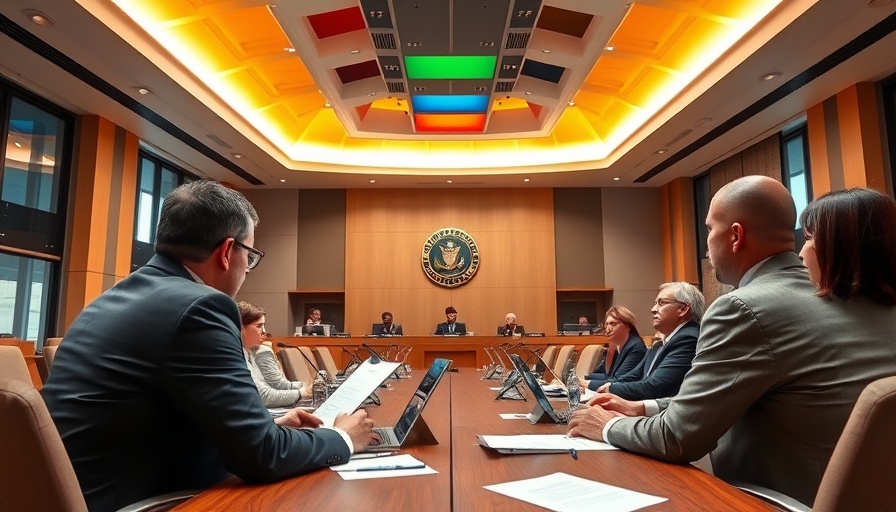
The EU Steps In to Support Vital Democratic Voices
As the landscape of independent journalism struggles under political pressures, the European Union (EU) has emerged as a crucial supporter of media freedom, particularly for Radio Free Europe/Radio Liberty (RFE/RL). Following the Trump administration's cessation of grants, the EU has pledged emergency funds to sustain this vital news outlet, which has historically acted as a beacon of democracy during tumultuous times.
The Importance of Radio Free Europe
Founded during the Cold War, RFE/RL has played a pivotal role in broadcasting unbiased news to those living behind the Iron Curtain and beyond. With programs reaching across 27 languages and covering 23 countries, this organization has not only informed but has also inspired civic engagement through its independent reporting.
The significance of RFE/RL is underscored by its commitment to providing accurate news where state-controlled media operate without accountability. The EU's foreign policy chief, Kaja Kallas, emphasized the need for such outlets, especially as misinformation spreads, and populations find themselves deprived of reliable information.
An Emergency Response to Political Change
With the announcement of a 5.5-million-euro contract, which amounts to $6.2 million, the EU is addressing an urgent funding gap. Kallas highlighted that while the EU cannot wholly replace the U.S. funding, it can serve as a temporary measure to ensure the organization's functionality in regions that rely heavily on external news sources.
This funding comes at a critical time; a U.S. federal judge recently mandated the reinstatement of a prior $12 million appropriation after RFE/RL's lawsuit against the Trump administration. However, without a more stable long-term solution, there remains a looming threat over the organization's future.
A Network of Support Emerges
The EU’s intervention is also indicative of a broader defense for democratic norms in media. Countries across Europe are being called upon to contribute to RFE/RL, ensuring a diversified funding base that can withstand political shifts in any single member state. This proactive stance speaks volumes about the EU's commitment to independent journalism and democratic values.
Historically, Kallas noted how RFE/RL shaped her own understanding as a young girl in post-Soviet Estonia, reinforcing the emotional and societal connections the outlet forges with its audience. This personal testimony strengthens the argument for continued support as RFE/RL combats narratives that threaten democratic integrity.
The Bigger Picture: Media Freedom at Risk
As critical funding disappears, media freedom globally faces unprecedented challenges. The reliance on state funding subjects news organizations to political machinations, often compromising their independence. As the U.S. re-evaluates its role on the world stage, the EU's actions signal not only concern for RFE/RL but for the future of journalism itself. The decline of independent media could lead to an era where information is tightly controlled, erasing the line between fact and propaganda.
This situation is reflective of a larger trend witnessed in several democracies where media outlets have found themselves under attack for their editorial choices. Drawing parallels to similar instances—such as those seen in places like Hungary and Poland—certain governments are increasingly wielding financial control as a tool to suppress dissenting voices.
Final Thoughts: Engaging with Media Freedom
In this crucial moment, it's apparent that the EU's support is more than just financial; it symbolizes a commitment to truth and accountability in journalism. For entertainment enthusiasts, families, and cultural tourists alike, the closure of independent media would mean a profound loss—not just of news but of the very fabric of a democratic society.
As the EU window seeks to bolster RFE/RL’s capacity, the need for awareness and engagement with democratic media presents itself. By choosing to support independent journalism—whether through enhancing media literacy or participating in discussions around content—communities can ensure that their voices remain heard.
In light of these developments, staying informed about policy changes and understanding their impact on journalism helps in recognizing the vital role media plays in our societies. Stay engaged, amplify democratic voices in media, and support initiatives that prioritize truth in reporting. Together, we build communities better informed and capable of discerning truth from governmental narratives.
 Add Row
Add Row  Add
Add 






Write A Comment